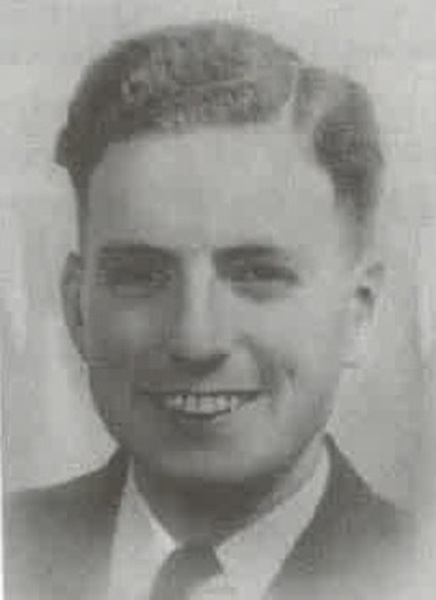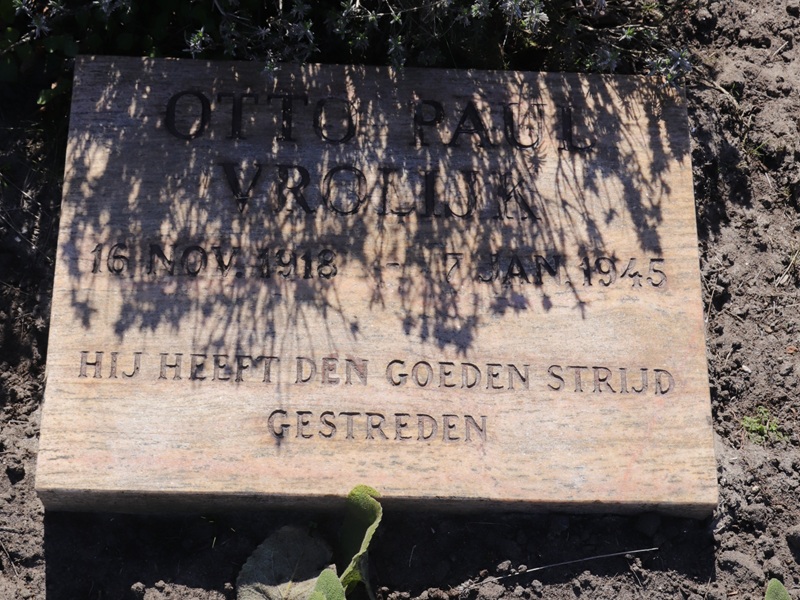Vrolijk, Otto Paul
- Date of birth:
- November 16th, 1918 (Buitenzorg/West Java, Dutch East Indies)
- Date of death:
- January 7th, 1945 (Limmen/North Holland, Netherlands)
- Buried on:
- Dutch Honorary Cemetery Bloemendaal
Plot: 34. - Nationality:
- Dutch
Biography
Lived in Amsterdam, Zwanenburgwal. Son of Maarten Vrolijk and Suzanna Aleida Koch. Unmarried.
Otto Vrolijk was a corporal in the Dutch army during the German invasion in May 1940. After the capitulation, he was put to work for some time in the Opbouwdienst and Nederlandse Arbeidsdienst (NAD). The Germans had set up the Opbouwdienst to deploy Dutch soldiers who had become unemployed after the capitulation to repair the damage caused by the war. The NAD was the successor of the Opbouwdienst and aimed to educate the Dutch people in the national socialist ideology.
After this compulsory labour, Vrolijk became a civil servant at the insurance company Centraal Beheer. In April 1943, the occupying forces obliged Dutch ex-soldiers to allow themselves to be taken back into German prisoner of war camps. Vrolijk refused and went into hiding.
Vrolijk carried out illegal work from April 1943 to August 1944. He first did this in his own resistance group, later as a member of the Ordedienst (OD). The OD was a national illegal organisation that had partly originated in military circles.
In Amsterdam he was involved in helping people in hiding, setting up OD squads and enlisting and instructing female students as couriers and first-aiders.
In September 1944, he became platoon commander of the Binnenlandse Strijdkrachten (Domestic Armed Forces). He transported weapons, gave weapons instruction and, his ‘speciality’, stole weapons and bicycles from the occupying forces. Together with two others, he carried out a successful raid on a German Navy food depot in Amsterdam.
On 16 December 1944, two resistance fighters with connections to Pallas were arrested during a spy mission near Barneveld. Pallas was a student fraternity house in Amsterdam where many resistance fighters had gathered since September 1944 and also stayed overnight. Weapons were also stored there.
During harsh interrogations involving torture, one of the resistance fighters broke and gave up information about Pallas and the key to the house. As a result, all those present in Pallas, including Vrolijk, were arrested by the Sicherheitspolizei in the early morning of 19 December.
They were transferred to the prison on Weteringschans. During the interrogations, Vrolijk tried to take all the blame for the weapons that were found. He managed to conceal his connections with the Binnenlandse Strijdkrachten (Internal Armed Forces). All those arrested were put on the Todeskandidaten list of people eligible for execution by firing squad in reprisal.
On 7 January 1945, Vrolijk was shot in Limmen along with nine other resistance fighters, including fellow prisoners, in reprisal for the resistance's killing of a German conscript. The occupying forces ordered the ten bodies to be buried in a mass grave in the dunes near Overveen.
Do you have more information about this person? Inform us!
Sources
- Photo 1: Eerebegraafplaats Bloemendaal
- Photo 2: Arjo Eijgelsheim
- - Overlijdensakte 16 d.d. 1 februari 1945 gemeente Limmen.
- Eerebegraafplaats Bloemendaal



